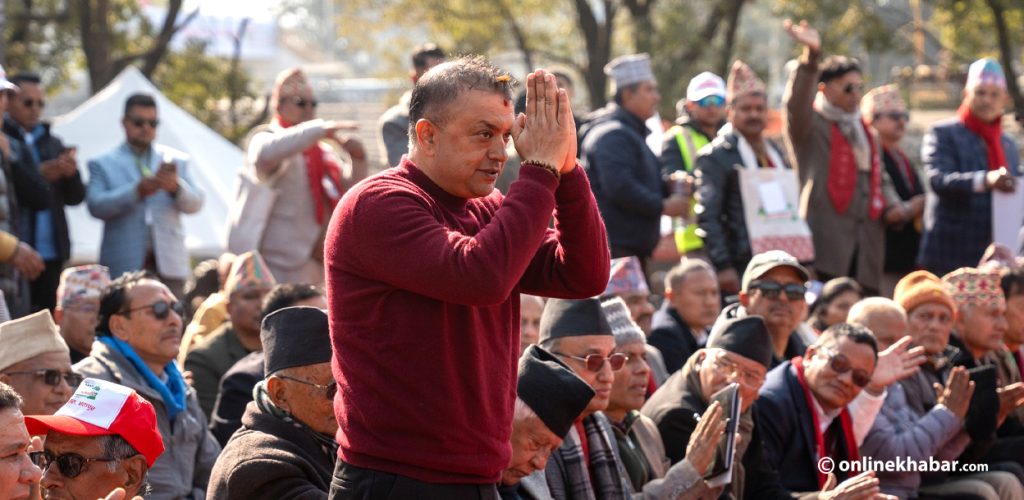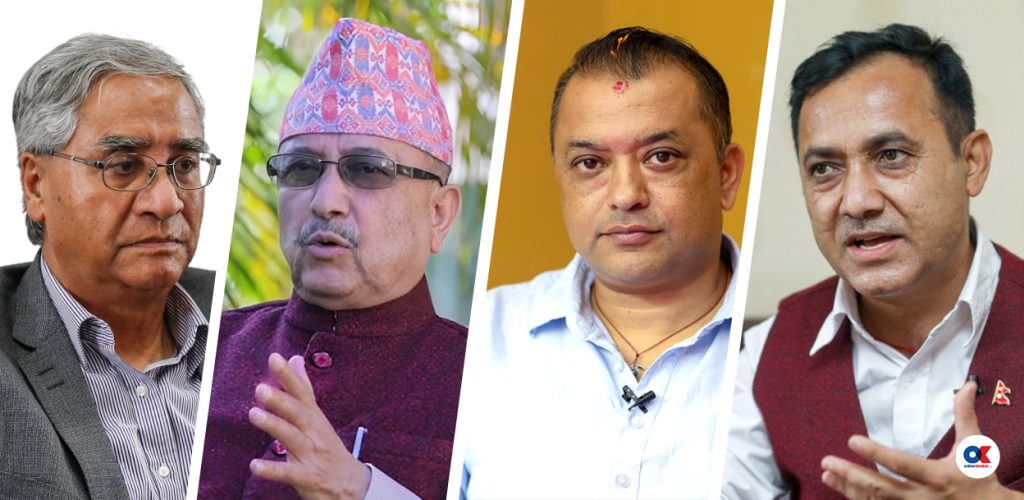
A little while ago, I had an opportunity to meet Bharat Prasad Upreti, the founder president of the Nepali Congress’ Dhading chapter. Upreti, who is in his nineties, started his political journey in the district by joining the Congress party in 1949. He actively participated in all political revolutions and movements since 1950.
Upreti, who survived many painful experiences during both the Rana and Panchayat periods, had a long association with great leaders such as BP Koirala, Subarna Shamsher, and Ganesh Man Singh. Upreti claims Koirala used to come to his house in Baneshwar for tea. Some mornings, he would visit Koirala’s house in Chabahil to reciprocate. Obviously, they would talk about politics most of the time.
Talking about the Congress leaders of that time, Upreti recently mentioned Sher Bahadur Deuba. “At that time, courage was not enough to raise the flag of democracy against the Panchayat regime,” he said, “But, I have seen Sher Bahadur had the guts to face any difficulty (to speak against the regime).”
The revolutionary version of Deuba
In the words of Upreti:
Sher Bahadur Deuba was among many Congressmen arrested in the Jaisidewal bomb scandal. At that time, he was quite young, but he showed great bravery and did not bow down to power.
My childhood friend Prayag Raj Sharma left Congress and joined the pro-Panchayat side at that time. Then, we brought bombs and detonated them at his home to stop other fugitives.
After the bomb explosion, the home minister came there and said, ‘I will kill these Congressmen one by one’. A frightened Sharma was sitting in panic. I was also caught by the police even though I returned home cleverly from there.
It was a difficult stay in detention. Sher Bahadur Deuba was kept in another room. A boy from the far west, he did not have anyone in Kathmandu to take care of. There was nothing to eat or drink. I would share my food with him.
Remembering the torture inflicted on him, I still tremble with fear. Hit by fists all over, his body was black and blue throughout. Once they Inserted a stick into his anus, giving overwhelming physical and mental torture, hoping they could make him surrender, but he did not say anything. Many Congressmen would have been caught if he had surrendered. Sher Bahadur Deuba had such allegiance and commitment.
He is much younger than me as he started the politics of the student union around 1963. However, when I see his sacrifice, I always feel like he is a senior.’
The new version of Deuba

During those years, the leaders used to compete with each other in terms of “revolutionariness” at the front of the struggle. Consequently, the leaders including Sher Bahadur Deuba proved themselves adept at changing the political system.
They also succeeded in making Nepal a republic and writing an inclusive constitution. But, they could not make the daily life of the common people easy. If you make a list of the problems Nepal is facing, it gets as long as all the roads in the country join together.
It may be relevant to recall a context from the Soviet era here. Vladimir Lenin’s followers went to a village to convince people of the revolution, but the peasants were not ready to listen to them. And Lenin, who was also there commanding his team, understood the needs of the farmers and distributed tractors. It resulted in peasants chanting ‘Long live Lenin!’.
Citizens do not understand the importance of democracy until it starts to serve their daily life system. As the old generation of Nepali politics has lost the ability to deliver services to the citizens, democracy has become insignificant to them.
Sher Bahadur Deuba’s generation has already got a lot of opportunities at present just because they contributed to the nation in history. Becoming the prime minister five times is an opportunity beyond the imagination for the leaders of most democratic countries of the world. However, in the case of Deuba, this is taken for granted.
He was active in leading the change of the political system, but he misused the opportunities he had by setting bad precedents one after another. Deuba continued to strive to make parliamentary politics a ‘pig cage’ as Lenin said.
Addicted to power, he has become a tendency from an individual, a tendency to compromise anything for it. This tendency erased his glorious history. He always ignored the opportunity to restore the history of glory by changing the ‘course’ of power-oriented politics. Recently, it was seen that he chose the path of decadence.
Many leaders who maintained their political integrity during the period of extreme repression of rulers have ended themselves up in the lust for power. This has become a trend in Nepali politics, with examples galore.
Sher Bahadur Deuba had an opportunity to restore his ‘brave’ image when he was contesting the parliamentary party election with the party’s “youth” leader Gagan Thapa. However, he wasted this opportunity by forgetting that he once fought against Girija Prasad Koirala.
Earlier, Girija Prasad Koirala used to be introduced as the leader who got his several effigies burnt. The leadership skills he exhibited at a particular moment in history restored him to politics. The civil war came to an end due to his wisdom. It was possible because of his ability to turn a political crisis into an opportunity. At that time, no one else could make that decision except him. But today, Deuba did not bother to follow that path.
The impact

Even now, Nepali politics is at risk. Leaders are saying that the achievement of change is in crisis. There are clear signs that the country is following the path of Sri Lanka economically and the Philippines politically.
It was not long ago that an economic crisis erupted in Sri Lanka and the acting president had to flee the country overnight. In the Philippines, the son of the infamous dictator Ferdinand Marcos has returned to power. Marcos Jr has become the president out of the languor of democratic forces and (ab)use of the young generation addicted to social media who are unknown of the history of the recent past.
The same background is being prepared in our country. The population of the generation that fought against the Panchayat and Rana regimes is getting weaker. The generation born after the people’s war of the CPN-Maoist and the 2006 people’s movement is growing up. They do not know the Panchayat and royal rules.
Like in the Philippines, the new generation of Nepal, who is in the Internet age, is not even interested in history. It seems that the increase in procrastination of the democratic forces is facilitating the growth of regressive forces in Nepal.
In this situation, Sher Bahadur Deuba’s wise decision could have been of far-ranging importance. This decision would not have been as effective if it had been made by someone else. But, he stubbornly missed that opportunity.
The recent general elections have also given a message that frustration is growing among the citizens. If the central politics of the country continues to deviate in the same way, there is a risk that this dissatisfaction will turn into mass frustration. The leaders of the older generation seem to be oblivious to the flames of growing dissatisfaction within Nepali society.
Unlearned Deuba

Sher Bahadur Deuba is not an empty-headed leader. He made the party the first in the recently concluded elections. However, in politics, it is not enough to pass one exam; they have to keep taking and passing several tests. Deuba could not make decisions according to the changed political equation and polarisation.
Even within the party, he could learn from Shekhar Koirala’s latest and sensible decision to withdraw from the bid to become the leader of the parliamentary party. That decision has made Koirala not weak, but more reliable and potent. The power gained by winning trust in politics is many times more powerful and lasting than the power gained by authority.
Gagan Thapa patiently walked a long but sustainable democratic path and convinced Shekhar Koirala to support him. Koirala became ready to trust the new generation for political transformation. Bishwa Prakash Sharma continued to support Thapa. Another young leader, Pradip Paudel, also came to support him, understanding that the division of the new generation would help the old one. In this way, a new phase of polarisation took place within the Nepali Congress.
But, Sher Bahadur Deuba followed his astrologer’s advice and the instigation of his kitchen cabinet. He did not pay attention to the changing politics inside and outside the party. Although he understood the situation, he did not consider what steps could have been wise. As a result, he lost what he had in his desperate bid to gain more. Along with himself, he made the Congress party a ‘losing gambler’ too suddenly.
There was a competition within the Congress party for the leader of the parliamentary party. This is natural in a democratic party, but a democratic competition does not always give the best results. Deuba was elected the leader and showed partisanship towards the rival group.
If Sher Bahadur Deuba had shown wisdom to pave the way for the young generation by restraining his ambition to become the leader of the parliamentary party for the sixth time, the political landscape of the country and his height would have been different.
But, Deuba did not even care about the history of the Nepali Congress that Ganesh Man Singh became an all-respected leader (sarbamanya neta) even by rejecting the position of prime minister. Instead, he pushed himself to the path of a depressing political exit.
This story was translated from the original Nepali version and edited for clarity and length.
























